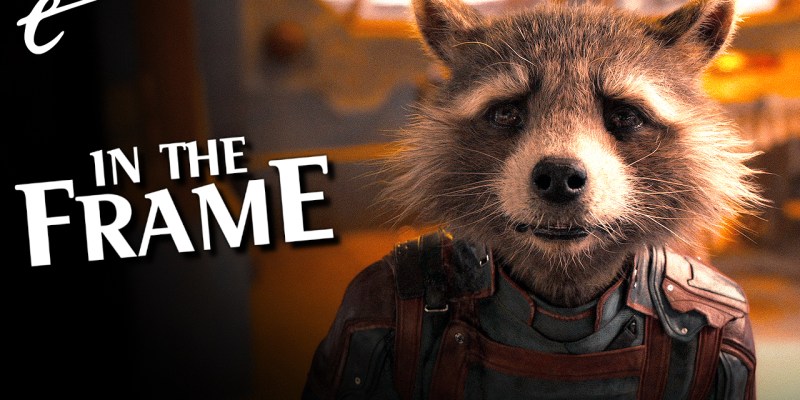This article contains light spoilers for Guardians of the Galaxy Vol. 3 in its discussion of Rocket Raccoon and the earnest approach taken to depicting him.
Guardians of the Galaxy Vol. 3 has been a success by most measures. The film has garnered strong reviews, topped the box office while earning an “A” CinemaScore, and has held stronger in its second weekend than recent Marvel Studios films like Ant-Man and the Wasp: Quantumania or Thor: Love and Thunder. While its opening weekend was softer than that of Guardians of the Galaxy Vol. 2, that is most likely just an indication of a more general audience fatigue with the larger genre.
However, there has been an interesting strand of criticism of the movie, one that accuses writer and director James Gunn of taking his comic book subject matter a little too seriously. After watching the movie, New York Times writer Kyle Buchanan joked that the movie was “What if A Little Life, but raccoon?” alluding to Hanya Yanagihara’s bestselling novel about a group of friends living in New York City who are forced to reckon with the unprocessed childhood trauma of one of their members.
The implication seemed to be that this subject matter was a little too self-serious and too self-important for a brightly colored comic book movie starring a talking raccoon. The criticism was echoed by NME critic Olly Richards, who lamented the “gloomy edge” of this “raccoon version of A Little Life.” While accepting that there was no way of “topping” Buchanan’s wry observation, NPR critic Glen Weldon opined that the movie “aims for pathos but achieves only bathos.”
Obviously, what works for one viewer may not work for another. Films are an inherently emotional medium, and that emotional connection is undeniably subjective. What moves an audience member, and how far it moves them, will vary from one person to another. However, within this strand of criticism of Guardians of the Galaxy Vol. 3, there is a sense that Gunn’s greatest sin is taking this comic book subject matter seriously.
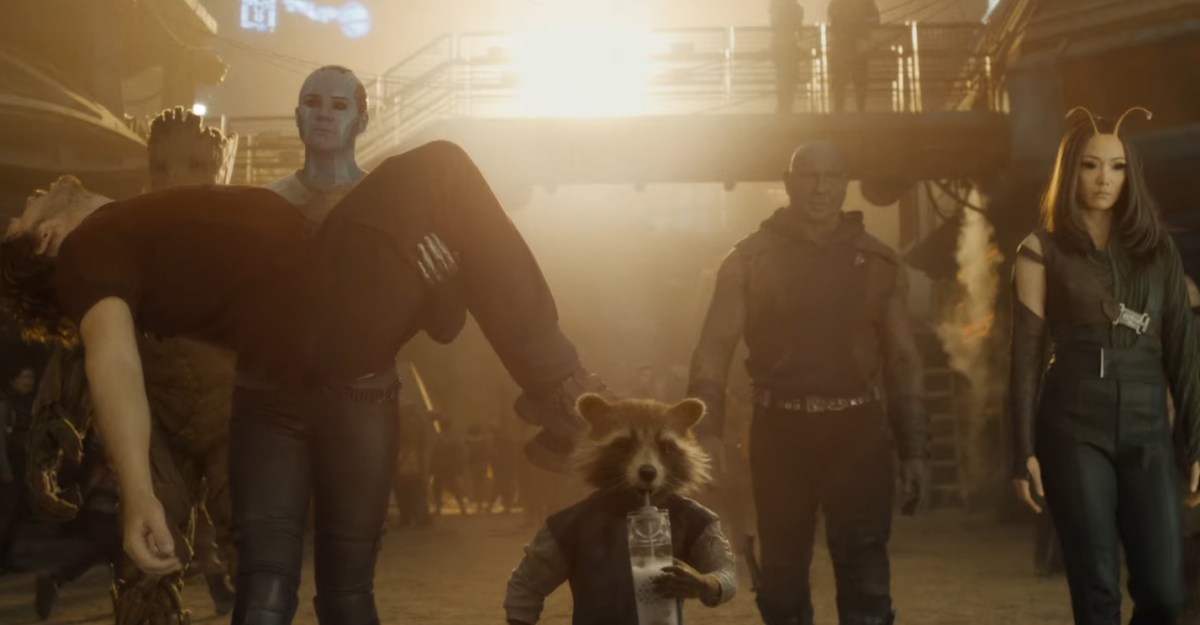
Guardians of the Galaxy Vol. 3 is a movie about Rocket Raccoon (Sean Gunn, Bradley Cooper), a computer-generated anthropomorphic trash panda with a thick Brooklyn accent and a fondness for large guns. The character is fundamentally absurd in the way that many of the best comic book characters are. Rocket feels like he should be a mascot or a joke, something of a spiritual companion to the cartoon characters of Disney or Warner Bros., from Mickey Mouse to Bugs Bunny.
However, part of the beauty of the Guardians of the Galaxy trilogy has been Gunn’s refusal to follow that path of least resistance. Sean Gunn and Bradley Cooper treat Rocket Raccoon as an actual character rather than a visual joke. In particular, Cooper’s vocal performance is remarkable. This is apparently a source of some controversy within Disney, with one unnamed former executive reportedly complaining, “Why did we pay money for Bradley Cooper if he doesn’t even sound like Bradley Cooper!?”
When Gunn was originally pitching to direct Guardians of the Galaxy, Rocket was his way into the story. He remembers driving home, stuck in traffic on the 405, when it clicked. In interviews, Gunn has openly acknowledged the connection that he feels to Rocket as a character. Describing Rocket as “100% the most personal character I’ve ever written,” he explained, “He’s the most me. I can’t even really talk about it much. Definitely. Definitely. He’s me.”
During production of the first film, he confessed, “He is what he is, and in all my time of writing and directing I don’t think I’ve ever felt closer to a character than I do to Rocket. I really do feel attached to him, and I think I’m beginning to understand some of Walt Disney’s madness around Mickey Mouse.” After he was fired from Disney, Rocket Raccoon was a large part of the reason that he accepted the invitation to return, explaining, “I feel like nobody would be able to tell his full story if it wasn’t me.”
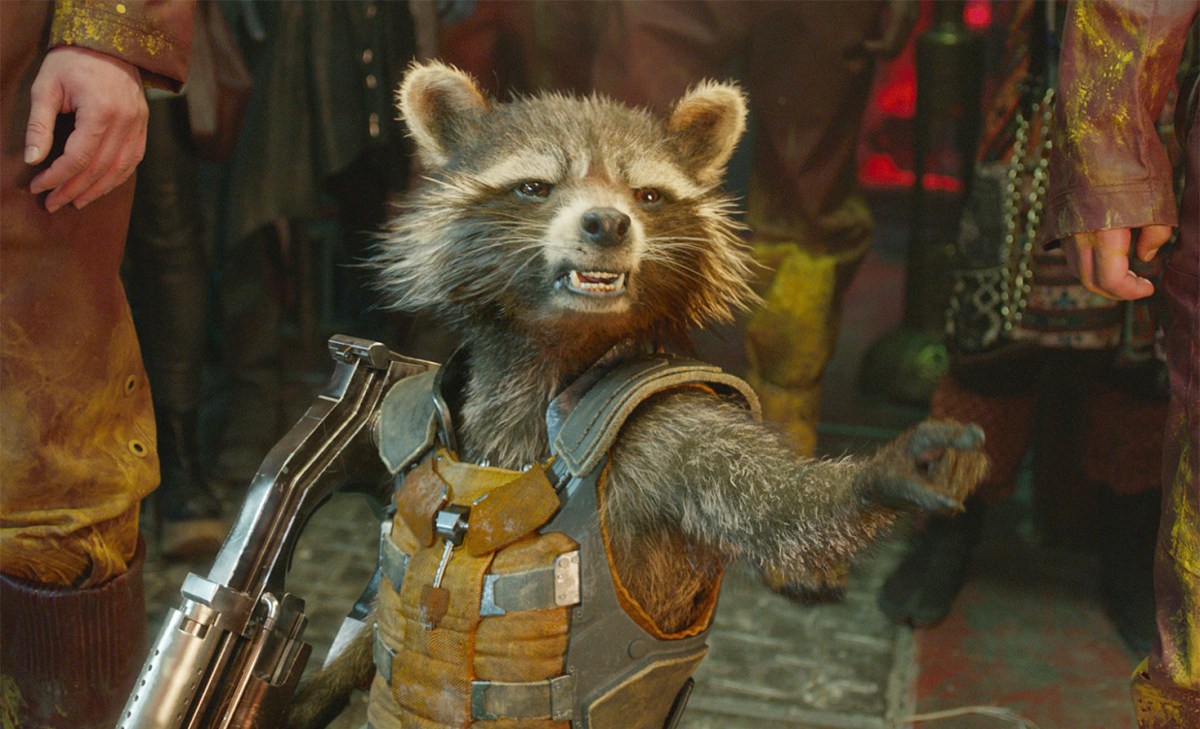
Indeed, this is a large part of the subtext of Guardians of the Galaxy Vol. 3, a movie that is fundamentally about a group of friends coming together to rescue Rocket from a monstrous corporation that sees him as a piece of intellectual property to be harvested and exploited. As writer and director, Gunn treats Rocket with the same dignity and respect that he affords more traditionally humanoid protagonists, and he trusts the audience to do the same.
Rocket Raccoon has a traumatic past that involves horrific abuse, like other Gunn protagonists. In Guardians of the Galaxy, Peter Quill (Chris Pratt) was stolen from his family by Yondu (Michael Rooker), who continuously threatened to eat him. Nebula (Karen Gillan) and Gamora (Zoë Saldaña) were turned into weapons by their abusive father, Thanos (Josh Brolin). In Guardians of the Galaxy Vol. 2, Peter discovers his biological father Ego (Kurt Russell) lives atop a mass grave of his own children.
In Gunn’s The Suicide Squad, characters like Bloodsport (Idris Elba), Peacemaker (John Cena), Ratcatcher II, (Daniela Melchior) and Polka-Dot Man (David Dastmalchian) are all defined by traumatic childhoods. In Peacemaker, Peacemaker confronts his abusive father, Auggie Smith (Robert Patrick) and Leota Adebayo (Danielle Brooks) struggles in her relationship with her manipulative mother, Amanda Waller (Viola Davis). These are all interesting and compelling character arcs.
These are one reason why Gunn is such a great superhero storyteller, why his work in the genre is so much more effective than that of many of his contemporaries. He builds real characters within these fantastical worlds, establishing genuine emotional stakes. There is also something personal in this. Gunn has discussed the “turmoil” created by his father’s alcoholism and about witnessing the child sexual abuse committed by Monsignor Russell J. Obmann at his grade school. This may be why Gunn returns to childhood trauma repeatedly in his films.
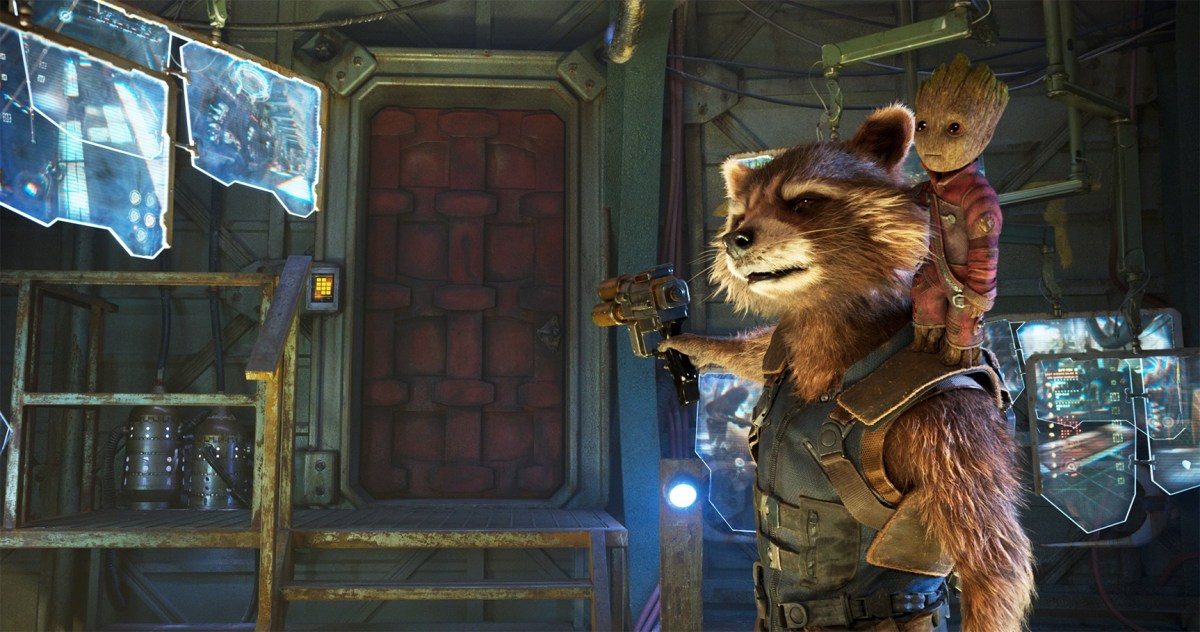
Gunn’s superhero movies are funny and ridiculous, but also earnest and emotional. They take these characters seriously, delving into their psychology and their trauma without belittling it. A big problem with the larger Marvel Cinematic Universe is an unwillingness to sit with anything even vaguely uncomfortable. Black Widow may be the most obvious recent example, a film that has to punctuate its exploration of abuse and misogyny with stupid jokes to deflate accusations of self-seriousness.
In contrast, Gunn is never so insecure in his treatment of Rocket Raccoon. The opening credits of Guardians of the Galaxy Vol. 3 play over a sequence of Rocket wandering around Knowhere, listening to an acoustic version of Radiohead’s “Creep.” In flashback, the character’s first word is revealed to be, “Hurts.” After stealing Rocket’s records from Orgocorp, his friends watch a holoprojection of Rocket’s vivisection. The scientists struggle to hold the animal still as he screams in agony. It’s tough to watch, and it should be.
The Marvel Studios house style was largely codified by the embrace of improvisation by Jon Favreau and Robert Downey Jr. on the set of Iron Man and then by an imitation of Joss Whedon’s wry and ironic voice on Avengers. This may explain why some comic book movie fans are so anxious about superhero movies that don’t embrace that knowing irony, why there is such a defensive backlash when a movie within the genre dares to approach its subject matter with seriousness and sincerity.
These criticisms of the “solemnity” or “thudding earnestness” of Guardians of the Galaxy Vol. 3 feel slightly snobbish, as if this movie about a talking raccoon is getting ideas above its station by even reaching for emotional sincerity. There are echoes of the High Evolutionary’s (Chukwudi Iwuji) final rant against Rocket Raccoon: “How dare you think you are more than you are!” It’s a critical argument that amounts to “stay in your lane.” It’s a very limiting view, one that tries to draw (and entrench) firm lines between high and low culture.
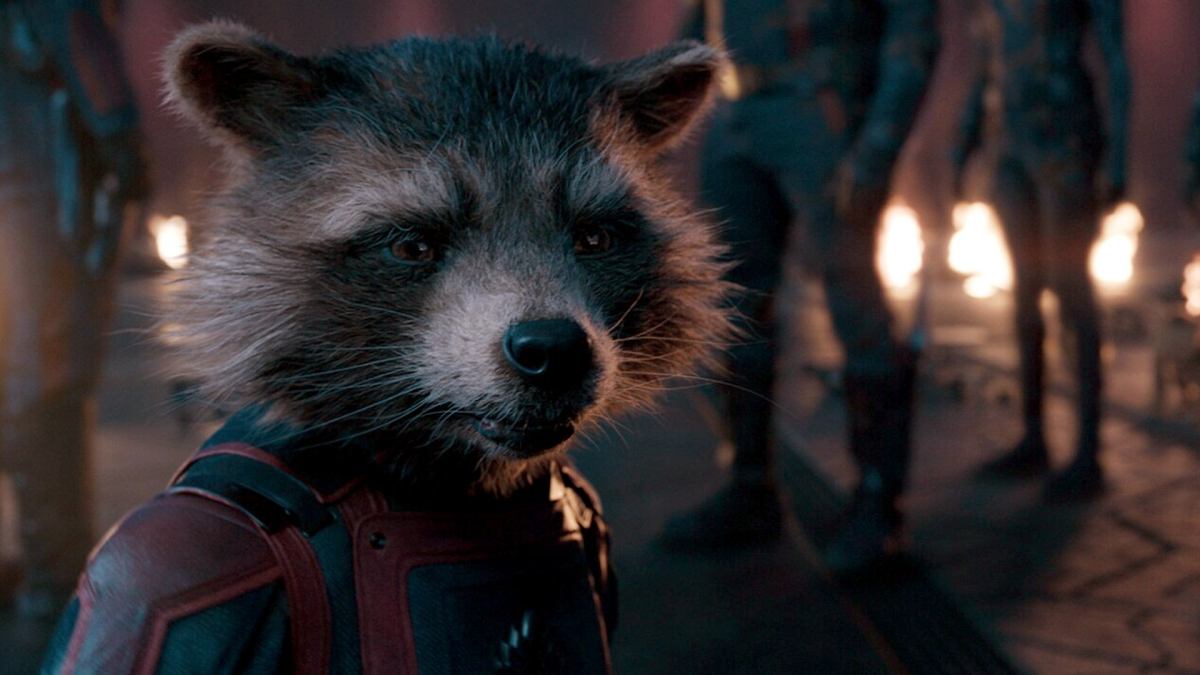
The superhero movie is often likened to older forms like the western or the musical — fantastical mass entertainment frequently drawn in broad and cartoonish terms. However, both the western and the musical were allowed to evolve and mature over time, often by treating these pulpy archetypes with seriousness and maturity. After all, how could these movies expect critics and audiences to take them seriously when they refused to take themselves seriously?
When cowboy actor Clint Eastwood started directing movies, he summed up the popular consensus: “What is this jerk doing directing films we’re not going to like when we don’t even like him as an actor?” Less than a decade after making that point, Eastwood’s revisionist western Unforgiven would go on to win him Best Picture and Best Director. It feels appropriate that Eastwood is a massive influence on Cooper, who is also an actor who has become a director and who worked with Eastwood on both American Sniper and The Mule.
More to the point, part of the appeal of comic books has always been that inherent contrast between pulpy concepts and big philosophical ideas, a desire to engage with ridiculous premises with an endearing earnestness. Jack Kirby repeatedly attempted to define his comic book characters as a modern mythology: his work on Thor and his invention of both The New Gods and Eternals. These concepts simply wouldn’t work if they were approached with winking irony or knowing detachment.
The best writers blended absurdity and sincerity. Chris Claremont reinvented the X-Men villain Magneto from a one-dimensional megalomaniacal baby-play enthusiast by giving him a backstory rooted in the Holocaust, the greatest tragedy of the 20th century. That revision of Magneto’s history provided the basis of the opening scene of Bryan Singer’s X-Men and arguably heralded the modern comic book movie boom. Today, would that choice be flippantly dismissed as “what if Shoah, but magnetic?”
Guardians of the Galaxy Vol. 3 carries over that willingness to blend absurd concepts and genuinely emotional storytelling. Much is written about how the films of Marvel Studios are “proud” or “not at all embarrassed” to be comic book movies, but that argument is undermined by their dependence on winking jokes. In contrast, Gunn’s movies are actually true to the spirit of comic books. There’s no defensive irony here. It is a $250 million film that takes its talking raccoon seriously, and it is the better for it.
